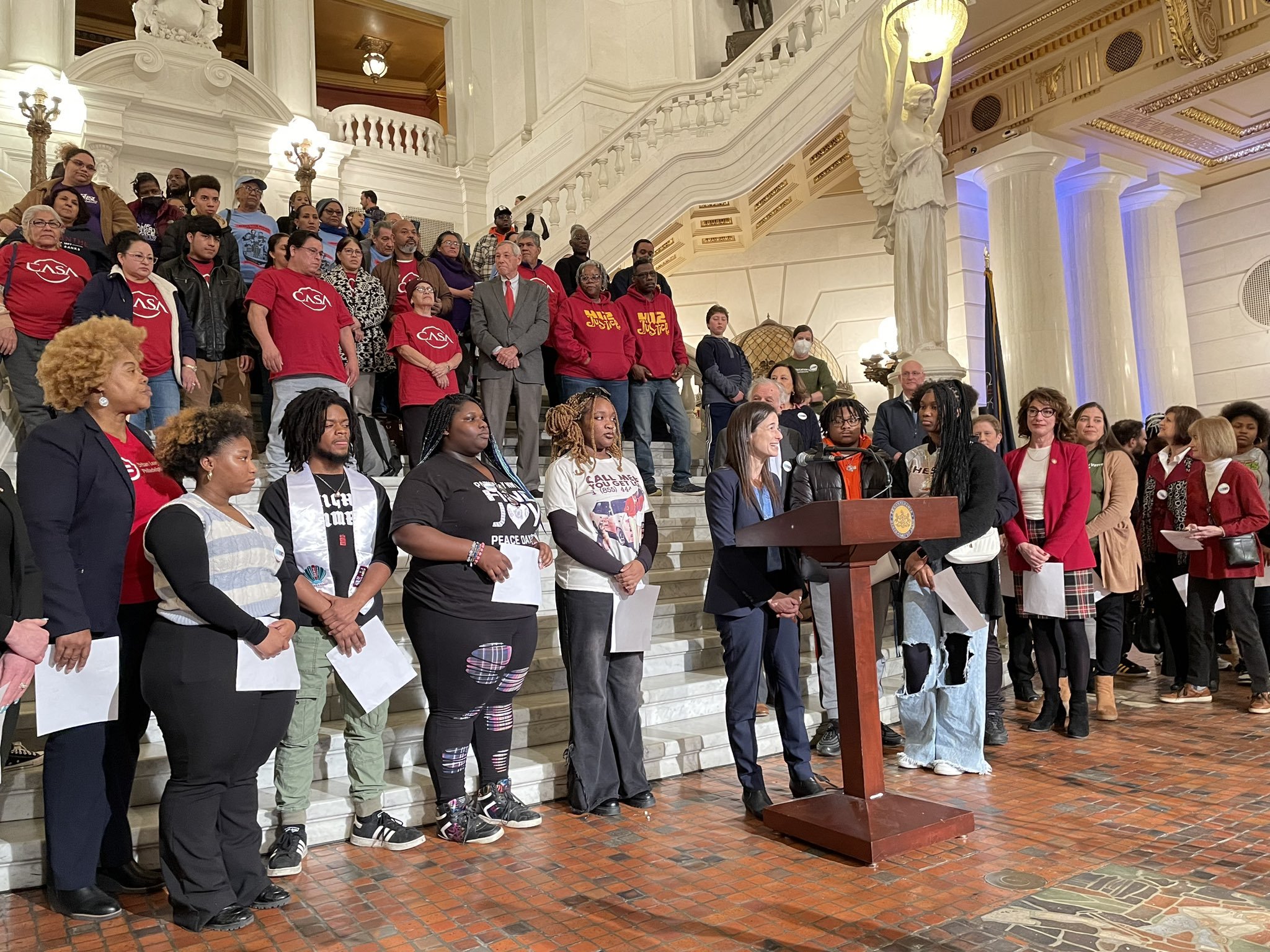February 7, 2024 - One year ago today, Commonwealth Court ruled that Pennsylvania’s school funding system is unconstitutional and must be reformed, ruling in favor of petitioners in the Pennsylvania school funding lawsuit.
Now, there is a potentially transformational plan on the table, developed by the Basic Education Funding Commission and affirmed by Governor Josh Shapiro in his Feb. 6 budget address, to deliver resources to public schools based on what students need, not what communities can afford.
Today, parents, students, educators and lawmakers from across Pennsylvania gathered in Harrisburg, organized by PA Schools Work, to commemorate this anniversary and read quotes from testimony and the court’s decision. Watch the event here. Read the prepared remarks from representatives of Education Law Center-PA and the Public Interest Law Center below.
Opening remarks from Deborah Gordon Klehr, Executive Director of Education Law Center-PA
Happy anniversary!
I’m Deborah Gordon Klehr, executive director of the Education Law Center. We’re a member of the PA Schools Work coalition and one of the two law centers that worked with school districts, families and organizations that challenged the state funding system in court.
Today is the first anniversary of a big, big day for Pennsylvania public school students and also for all of us who have tried so hard to achieve an adequate, equitable, and racially just school funding system.
Last year on Feb. 7, Commonwealth Court came out with a decisive ruling in our favor. 786 pages!
The ruling declared the state funding system unconstitutional.
It declared that education is a fundamental right.
It was a win for equity in education, for students, and for everyone in our state.
The court recognized that all children CAN learn when given the proper tools.
The court said that inadequate funding discriminates against students in low-wealth districts and that there is NO justification for denying students in low-wealth districts a quality education.
The court told all the parties to work together on a plan to ensure that all children can receive a comprehensive, effective public education.
The court’s decision was a powerful, urgent mandate for change. It was so compelling that it was not appealed.
So. Where are we, one year later?
State officials launched a Basic Education Funding commission to come up with a plan – a remedy to the funding system. The commission held hearings, many of you here today helped educate commission members, and last month, they adopted a report.
It’s not perfect, but it’s a big step in the right direction, a serious plan for fair school funding.
Finally, we have a plan that says how much our children need.
And yesterday that plan was the basis for a historic budget proposal from Governor Shapiro, who is proposing to implement year 1 of the commission’s plan. He wants to increase education spending by $1.8 billion in this year’s budget.
What happened yesterday moved us closer to fixing how our schools are funded. Obstacles remain, but we are on a path that could be transformational for generations of Pennsylvania children.
Today we gather not just to celebrate the anniversary of our Court victory but also to talk to legislators about making the right to quality education a reality in Pennsylvania.
And what’s next is a reminder about what the decision says, including testimony on conditions in schools that the judge cited.
On the very first day of testimony in the trial, the superintendent of Panther Valley School District described a school where 75 kindergartners had to share a single toilet. As we think about those 75 kindergartners who had to wait on line, we are going to hear 75 short quotes from the court ruling. Let’s begin.
Closing remarks from Dan Urevick-Ackelsberg, Senior Attorney for the Public Interest Law Center
One year ago, Commonwealth Court found our public school funding system unconstitutional.
And so, now what? No one bothered to so much as appeal the decision. So it is final. All that is left to do is fix it.
Here is what a solution must mean:
First, rather than small bore fights each year, we instead identify what it takes to help each child succeed, and then we meet those needs, no matter their wealth, their race, or their zip code.
That means that when a child needs a smaller class size to learn effectively, we give it to her.
That means that when a child needs a reading specialist to teach her to read, we give it to her.
That means when a child needs school-based counseling to deal with trauma, we give it to her.
That means when a building is overly hot, overly crowded, or filled with lead paint or asbestos, that we give that student and her classmates the kind of facilities we would want for our own children.
In technical terms, that means we actually determine funding targets for each district, and then we meet them. No more hiding the problem. Identify what each school needs.
The Basic Education Funding Commission did that job. Governor Shapiro did that job, just yesterday.
What did they determine schools need?
The answer, according to Governor Shapiro and the Commission—and you can look this up right now on PDE’s website—is $5.4 billion dollars, $5.1 billion of which is supposed to come from the state. $5.1 billion.
But that is not money for money’s sake. It is money to infuse our schools with the professionals—teachers, counselors, tutors, librarians—that can change the trajectory of a child’s life, and fix the buildings that are crumbling around them.
This means, of course, we need every single legislator to demand passage of the Governor’s budget. But we won’t end the crisis in one year—the scope of the problem is too big.
So this budget is only step one. It will only get us part of the way there. There is a step two, three, four, five, six, and seven.
So here is what is really critical: we need every single legislator to also enact legislation that will ensure that each year we take one more step, and close the entire $5.1 billion shortfall.
We won’t close the entire gap this year. But we must enact the plan that will get us there, from start to finish.
Which gets to all of you. From the moment we filed this case we told everyone who would listen that no court decision alone could solve this problem. That we needed to pair a clear court ruling with a public who demands the system be fixed once and for all.
You cannot just leave it up to the lawyers.
If we want the decision to be real, and to be real before a Kindergartner reaches adolescence, we all must be engaged, every single one of you.
So here is my challenge to you. This week: call your elected officials. Start with the Governor himself. Call his office. Thank him for the bold step he took.
And then demand from the Governor and General Assembly the enactment of a complete, multi-year plan to provide children what they need.
We will of course go back to Court if there is not a solution. We will use every tool that exists to force this system to give children what they need. But the best way that we deal with this urgent injustice is to gather together, and fix this now.
The Governor has put his hand up to lead. We need to stand behind him, pass his budget, and pass legislation to permanently end this injustice once and for all.

